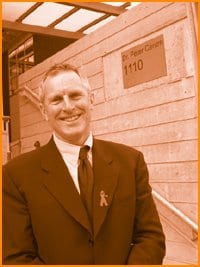Maxine Davis is speechless as she gazes around the new Dr Peter Centre on the corner of Comox and Thurlow St.
“I’m overwhelmed,” she says, soon moved to tears by the number of well-wishers stopping to thank her.
“It’s wonderful that this day has finally happened,” she continues. “We now have a place to provide comfort care the way we always wanted to.”
Davis is the executive director of the Dr Peter Centre, which officially moved into its new home this week. It’s been a long time coming. The centre has been operating 10 beds and a drop-in day program out of an old wing of St Paul’s hospital since 1998; now it finally has a home of its own.
And what a unique new home it is.
The expanded and improved Dr Peter Centre will set a new standard in Canadian AIDS care. By combining its ongoing daytime services with double the residential capacity, the centre will create a continuum of care for people deteriorating from AIDS who have little other support.
Residents will have their own suites and several levels of 24-hour nursing support from which to choose. They will also have access to the daily drop-in program, with its recreational, counselling, fitness, computer and other services. They’ll even have a back deck with a clear view of the Mole Hill gardens.
“It’s all about delivering good health care with love and respect,” says Andrew Hiscox, who co-founded the centre (named for his late partner, Dr Peter Jepson-Young) and helped coax it to fruition.
“Peter would be blown away,” Hiscox says, beaming proudly from the centre’s new lobby. “I feel ecstatic.”
Hiscox credits the community and all three levels of government for cooperating to bring the new building to light. The federal and provincial governments both helped fund the new centre’s construction, and the city of Vancouver has leased it the land (valued at $1.6 million) for $1 per year for the next 60 years.
BC’s ministry of health and its agency, the Vancouver Coastal Health Authority (VCHA), will also help cover the new centre’s operating costs, contributing $2.8 million between them each year. The VCHA only confirmed its portion of the subsidy last month.
Davis says she’s thrilled with the government support and was always confident that the money would come through in the end.
But it won’t be enough to keep the centre going.
The Dr Peter Centre Foundation will still have to raise $400,000 every year from the community to cover its operating costs. Davis says that’s not surprising. “We know we live in an era when government is not going to do it all,” she says.
“We are very thrilled that in these difficult times they thought it a priority to fund this residence,” she adds.
As for the $400,000 annual fundraising goal, Davis says she’s confident the centre’s many donors and supporters, both individual and corporate, will remain supportive.
When asked how this new fundraising goal will impact Vancouver’s other AIDS organizations, Davis says her centre has no intention of undermining anybody else’s efforts.
“We’re all colleagues in a common cause,” she says, adding that the different groups tend to focus on different donors, anyway.
Rick Barnes, spokesperson for AIDS Vancouver, agrees. The Dr Peter Centre has always been successful at raising money from “upper elite sources that many of us haven’t been able to tap into,” he says, downplaying any suggestion of competition between the AIDS agencies.
Barnes says he doesn’t expect the centre’s continued fundraising to hurt AIDS Vancouver now.
Besides, the Dr Peter Centre does great work, says the chair of the BC Persons with AIDS Society (BCPWA).
Many BCPWA members rely on the Dr Peter Centre’s services, so it’s in everybody’s interest to keep it alive, Malsah says.
“We are all in this together,” he continues. “I applaud the work that the Dr Peter Centre does, I really do.”
DR PETER CENTRE.
604.608.1874.

 Why you can trust Xtra
Why you can trust Xtra


